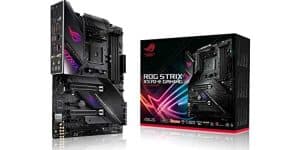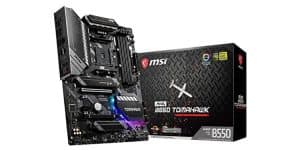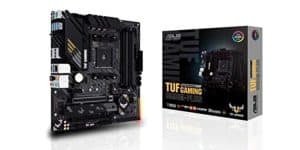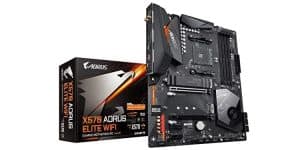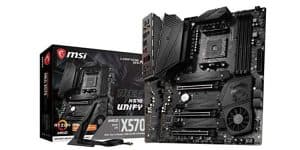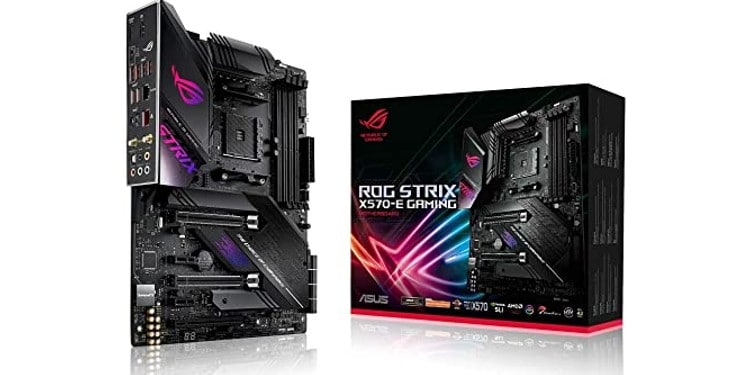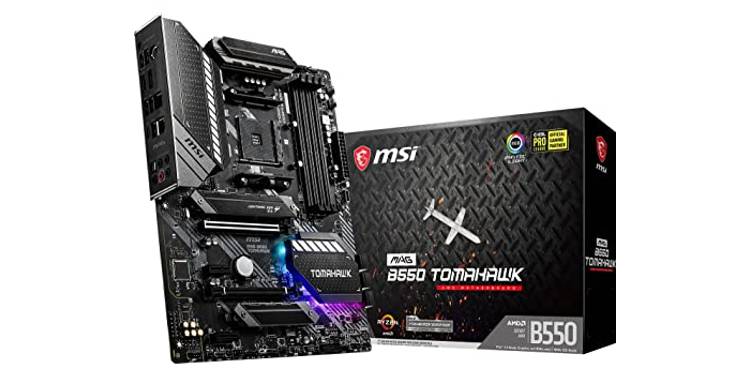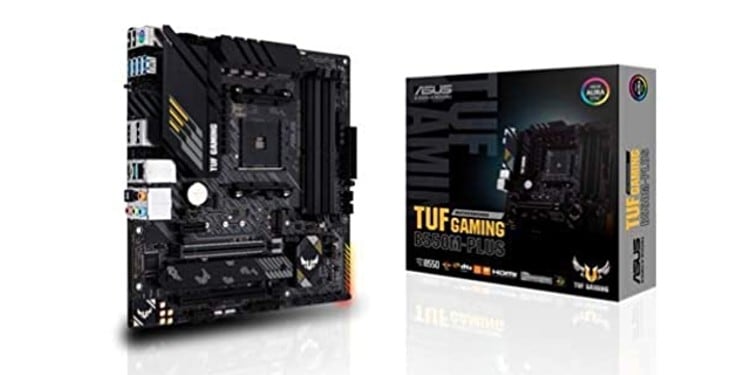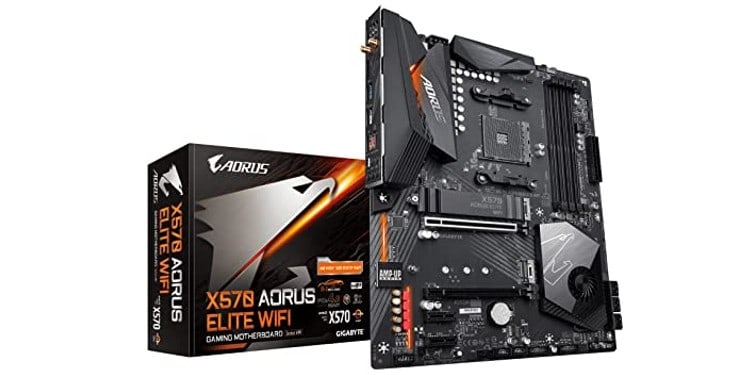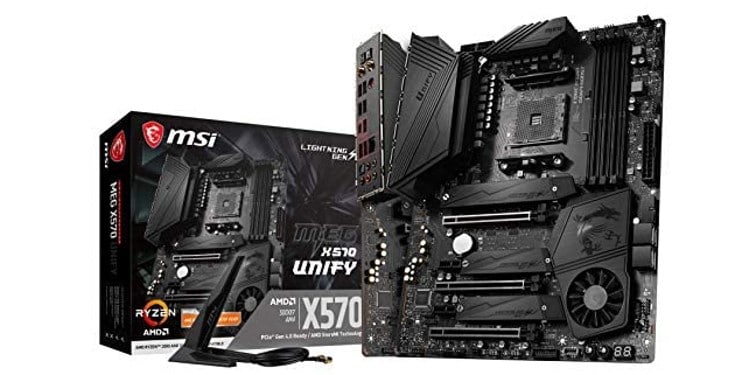Even if it has an AM4 socket, using a motherboard with insufficient specs can bottleneck performance and deteriorate user experience. Whether you’re looking for a budget-friendly B550 motherboard or a high-end X570, I’ve got some great options of best Ryzen 5000 Motherboards for you in this article.
Best Motherboard For Ryzen 5000 Series CPUs: Overview
B550 vs. X570: What’s the Difference?
When searching for a motherboard for your Ryzen 5000 CPU, you’ll surely come across these two terms at some point: B550 and X570. If you’re unaware of them, you have all the right to be confused and ask, “What’s the deal with these codenames?” Basically, they’re chipsets. When searching for a motherboard, the chipset you go for often determines the kind of features you get along with it. For example, heavy-duty VRMs, PCIe 4.0, Wi-Fi and Bluetooth support, Gigabit LAN, M.2 slots, and so on. Of course, as you must’ve guessed from the differing prices, B550 is more budget-friendly whereas X570 is for all the enthusiasts and high-end users out there. That’s true, but there are some other significant differences worth keeping in mind too.
Striking a Balance
Some people believe that the B550 chipset is only a watered-down version of X570 rather than a direct successor of the B450. However, for a select demographic of users, the chipset differences can be a game-changing factor, quite literally. Moreover, it’s always smart to buy a motherboard that is aligned with your CPU’s needs. Buying a high-end X570 for a 5600x is kind of a waste. On the flip side, a 5950x will be choked to run with a mid-range B550 motherboard. Here are some of the premium benefits X570 offers over B550: X570 motherboards generally also have better-overclocking capability due to having more VRMs, more PCIe lanes, and more ports and slots overall, which increases storage potential too. Since they also generate more heat, many even come with small onboard chipset fans. With the differences between both chipsets being noted, however, let me say that they’re still pretty similar. For the general user—anybody who doesn’t care about the tiny details and isn’t going to overclock the CPU—it all just comes down to specific models and the features they offer. So, let’s dive into my list of five of the best Ryzen 5000 motherboards.
Best Ryzen 5000 Motherboards
ASUS ROG Strix X570-E – Best Overall Ryzen 5000 Motherboard
If you’re looking for a premium and ready-to-use X570 motherboard, the ASUS ROG Strix X570-E can be the right pick for your PC build. Of course, it includes the AM4 socket, but it has many other features worth going over too.
CUP Socket: AM4 RAM Capacity: 128GB DDR4 (4 Slots up to 4400MHz) Connectivity: Intel WiFi 6, 2.5G Ethernet Port, Intel Gigabit Ethernet, and Bluetooth 5.0 Form Factor: ATX RGB Support: Yes (ASUS Aura Sync) Audio: SupremeFX S1220A
In terms of VRM, it has a 16-phase (12+4) power delivery system. While not the best, this is good enough to run all Ryzen 5000 CPUs without any hiccups. For memory, it features four DDR4 slots with speeds of up to 4400MHz. If you want, you can populate all four DIMM slots for a maximum capacity of 128GB, although that’s overkill for most users. For keeping the board cool, it features an active PCH heatsink, a MOS heatsink with a heat pipe, aluminum heatsinks for both M.2 slots, as well as a water pump header. It also wins strongly with networking features: Intel WiFi 6, a 2.5G Ethernet Port, an extra Intel Gigabit Ethernet port, and also Bluetooth 5.0, which is great for zero-lag competitive gaming. Overall, ASUS ROG Strix X570-E is an awesome motherboard for any Ryzen 5000 series CPU. It has all the ports you’ll ever need in the rear I/O, a great VRM system, and unique aesthetics. While we go more in-depth about motherboards for specific CPUs in the following reviews, this is a great option in general.
MSI MAG B550 Tomahawk – Best Motherboard for Ryzen 5 5600x
Sporting 6 cores and 12 threads, the 5600x is the best mid-range performance CPU in the 5000 series. Keeping that in mind, you need a budget-friendly motherboard with decent VRMs, I/O, and storage to run it optimally. The MSI MAG B550 Tomahawk is a great option.
CUP Socket: AM4 RAM Capacity: 128GB DDR4 (4 Slots up to 5100MHz) Connectivity: 2.5G LAN and 1G LAN Form Factor: ATX RGB Support: Yes Audio: Realtek ALC1200 / ALC1220P
First, let’s talk about VRMs. This motherboard has a 13-phase 60A power delivery system. If you’re using a 5950x, that would be decent; but with a 5600x that’s more than awesome. Along with that, you also get support for dual-channel DDR4 memory of speeds up to 5100MHz when overclocked and a maximum capacity of 128GB. In terms of build quality, while the board is mostly made of plastic, you get aluminum covers with thermal pads for the two M.2 slots. This also doubles as a great medium for heat dissipation, keeping the motherboard cooler. Plus, the monochrome design is also sleek and versatile, with the RGB lights only centered around the backlit “Tomahawk” typography. Of course, you also get the famous MSI Mystic Light software with this motherboard, along with extendable pin headers that give you access to over 16.8 million colors with 29 unique effects. If you love RGB and own other MSI components, like cabinet, GPU, and cooler then this is another benefit to consider due to ease of compatibility. All in all, if you’re looking for a reasonable and efficient motherboard and have a bit of passion for overclocking, the MSI MAG B550 Tomahawk is the perfect pairing for your Ryzen 5 5600x CPU.
ASUS TUF Gaming B550M Plus(Wifi)- Best Motherboard for Ryzen 7 5800x
In contrast to all the conventional ATX form-factor motherboards on this list, if you’re working with an SFF case then the ASUS TUF Gaming B550M Plus could be a superb option. It includes the AM4 socket and has all the bells and whistles for a beast SFF PC build.
CUP Socket: AM4 RAM Capacity: 128GB DDR4 (4 Slots up to 4400MHz) Connectivity: Intel WiFi 6 and 2.5G LAN with Asus LANGuard Form Factor: MicroATX RGB Support: Yes Audio: Realtek S1200A
As you might expect, a few compromises have to be made with the smaller form-factor design. First of all, it has a 10-phase (8+2) VRM power delivery system. This could be better, but it’s acceptable when you consider the form factor. Another compromise is that it has a conductive VRM and chipset heatsink instead of an in-built fan, which would’ve been a big plus too. In terms of connectivity, the TUF Gaming B550M holds up well. It has Intel WiFi 6 and 2.5G LAN with Asus LANGuard. You might not think of this as a standout feature, but it’s very important in SFF builds since they’re often used as portable PCs in different locations. So, in-build WiFi connectivity becomes a necessity in such cases. So, if you’re looking for a best motherboard for your Ryzen 7 5800x build, the ASUS TUF Gaming B550M Plus could be the right pick for you. The compromises made for the small size aren’t complete deal-breakers for most users, and it has all the necessary ports and slots you’d need, making this an impressive motherboard overall.
Gigabyte X570 Aorus Elite WiFi – Best Motherboard for Ryzen 9 5900x
Stepping up from the 5800x, with 12 cores and 24 threads the 5900x is an absolute workhorse. With a boost clock of up to 4.8GHz, it’s also a great choice for overclocking, both for gaming and high-end productivity workloads. With that in mind, my recommendation for the perfect motherboard for Ryzen 9 5900x is the Gigabyte X570 Aorus Elite WiFi. Let’s see why.
CUP Socket: AM4 RAM Capacity: 128GB DDR4 (4 Slots up to 4733MHz) Connectivity: Intel WiFi 6, 1G Ethernet Port, and Bluetooth 4.2 Form Factor: ATX RGB Support: Yes Audio: Realtek ALC1200
The 12+2 phase VRM design with DrMOS is sufficient in this case, and the addition of the built-in chipset fan is definitely a plus. Also, if you get a board that doesn’t have the ready BIOS for the 5000 series, you can use Q-Flash Plus to update it without installing an old CPU first. The rear I/O includes all necessary ports and is protected with an aluminum plate for durability. If you’re a video editor or a game designer and have to work with large files, the dual ultra-fast NVMe PCIe M.2 slots will definitely come in handy. To guarantee long-term performance, the X570 Aorus Elite WiFi also includes thermal guards for these SSDs. Moreover, you also get dual-channel DDR4 memory support with speeds of up to 4400MHz and a capacity of 128GB. To round off, the Gigabyte X570 Aorus Elite WiFi looks fantastic! The monochrome design with silver accents can fit right in any gaming PC build. Additionally, the onboard RGB implementation is also tasteful and minimal. In short, if you want to get your foot in the door with a fairly affordable X570 board, keep this one in mind!
MSI Meg X570 Unify – Best Motherboard for Ryzen 9 5950x
Apart from AMD’s Threadripper lineup of HEDT CPUs, the Ryzen 9 5950x is one of the most powerful processors you can buy right now. With 16 cores and 32 threads, all with a boost clock of 4.9GHz, it is truly a beast. So, you need a motherboard that is able to power it efficiently and also allows for overclocking. I present to you, the MSI Meg X570 Unify!
CUP Socket: AM4 RAM Capacity: 128GB DDR4 (4 Slots up to 5000+MHz) Connectivity: Intel WiFi 6 and 2.5G Ethernet Port Form Factor: ATX RGB Support: Yes Audio: Realtek ALC1200 / ALC1220P
The first thing you’ll notice about the MSI Meg X570 Unify is that it has no RGB lights! In an era when everything from credit cards to toasters has RGB, this is definitely a bold move from MSI. Of course, this is subjective. However, there are many gamers who prefer a stealthy and blacked-out design for their PC builds. So, this motherboard would fit right in. With design out of the way, let’s talk about power delivery. The Meg X570 Unify uses a 12+2 VRM phase, which makes it more than capable of handling a Ryzen 9 5950x. With all that being said, the Meg X570 Unify isn’t built shabbily either. The three M.2 slots feature aluminum covers, with a thermal pad attached to the bottom which dissipates heat. Plus, it also has a chipset cooler. Although pretty loud and impractical, it could come in handy if you decide to overclock your CPU, just in case. The rear I/O panel includes a CMOS button, BIOS flash button, WiFi antenna connections, seven USB ports along with a USB Type-C port. It is also protected with an aluminum cover to prevent damage from bending or shearing during installation. To summarize, thanks to a combination of great build quality, unique design, and powerful VRMs, the MSI Meg X570 Unify can be a great motherboard to power your 5950x!
Will these Motherboards Support Ryzen 6000 CPUs in the Future?
With Ryzen 6000 CPUs rumored to be released in 2022, you might be wondering: will a B550 or X570 motherboard be able to support them? Of course, it’s not possible to answer this question with limited information, but most likely AMD will move on to an updated and advanced AM5 socket. Here’s why. Back in 2016 when AMD first launched the Ryzen series, they stated that they’d operate the AM4 platform for four years. However, when the Ryzen 5000 series was launched in 2020, AMD tried to back out of their original statement and launch with the new AM5 platform instead. This meant users would have to buy new motherboards to use the newly released CPUs. As you can imagine, this led to a lot of public backlash. So, they eventually released it with the AM4 platform anyway. With that being said, it’s safe to assume that Ryzen 6000 CPUs will be on the AM5 socket. This isn’t only about the processors, but also about moving forward with next-gen technologies like PCIe 5.0 and DDR5 RAM—and either of those drives the need for an updated and advanced socket.
What’s AMD CrossFire?
When searching for either a B550 or an X570 motherboard, you’ve probably come across the term “AMD CrossFire” many times. So, what does it really mean? In AMD’s own words, “AMD CrossFire harnesses the power of two or more discrete graphics cards working in parallel to dramatically improve gaming performance.” So, basically, it enables you to connect two or more GPUs together for increased performance. In 2004, Nvidia was the first GPU developer to come up with this idea through their SLI (Scalable Link Interface) technology. AMD followed suit with CrossFire in 2005. While pairing up two or more GPUs to produce a single output sounds cool on paper, in the last few years, this technology has hit a wall. In theory, this technology is supposed to double your in-game FPS. But, in reality, due to lagging and stuttering issues, it performs worse than even single GPUs. To cut a long story short, AMD CrossFire isn’t a big deal for most users. Back in the early 2000s, it was all the craze. But, in 2021, it’s not really worth looking into. So, when searching for a Ryzen 5000 motherboard, there’s no need to look out specifically for this feature.
Top Beginner-Friendly Features in Ryzen 5000 Motherboards
Are you building your first PC? Believe me, it’s definitely a memorable experience. When I built my first PC, I learned from scratch and made many errors. However, these days the process is much smoother, especially when it comes to Ryzen CPUs. AMD chipset motherboards offer many unique features to make it easier to build your own PC. Here are a few noteworthy examples:
BIOS Switch
From the above list of motherboards, the Gigabyte X570 Aorus Elite WiFi has this feature. Basically, it allows you to update the BIOS or UEFI on the motherboard without installing any extra hardware. It’s extremely useful with B550 or X570 motherboards that haven’t yet been updated with the BIOS needed to run a Ryzen 5000 series CPU. It might not be a big deal for those who already have secondary parts available, but for any beginner who is just getting started, it can be a life saver.
Warning and Debug LEDs
To a seasoned PC builder, it’s easy to tell what’s wrong with a PC with a quick glance at the components and performance metrics. If it’s not booting up, if the CPU is thermal throttling, the RAM isn’t working, and so on. Unfortunately, to a beginner, it’s not so simple. If they build a PC and it doesn’t boot up, they won’t know what to do. In such a case, having any kind of debug LED can be amazing. They come in many forms, from the simple troubleshooting LEDs that convey errors using coded color combinations, all the way to Q-code debug LEDs that display an error code that you can easily look up in the motherboard manual. So, definitely look out for this feature when searching for a Ryzen 5000 motherboard. It’ll save you a ton of time when you come across an error.
Built-in WiFi and Bluetooth Support
Yes, I know, this is often considered as a premium feature; and if your motherboard doesn’t have this you can always use an external card. However, for beginners it’s just a lot more straightforward to have it onboard from the get go.
Ready to Join Team Red?
I hope this article helped you find the best motherboard for your Ryzen 5000 CPU! At the end of the day, it all just comes down to the fine details: how many M.2 slots you need, if you want in-built WiFi support, if RGB is a priority, and so on. So, aligning your technical needs with a motherboard that fulfills them can help you find the perfect combo. Once you’ve made this decision, choosing the rest of the components for your system becomes a relatively straightforward task since it’s all catered to the motherboard, more or less. Happy hunting!
